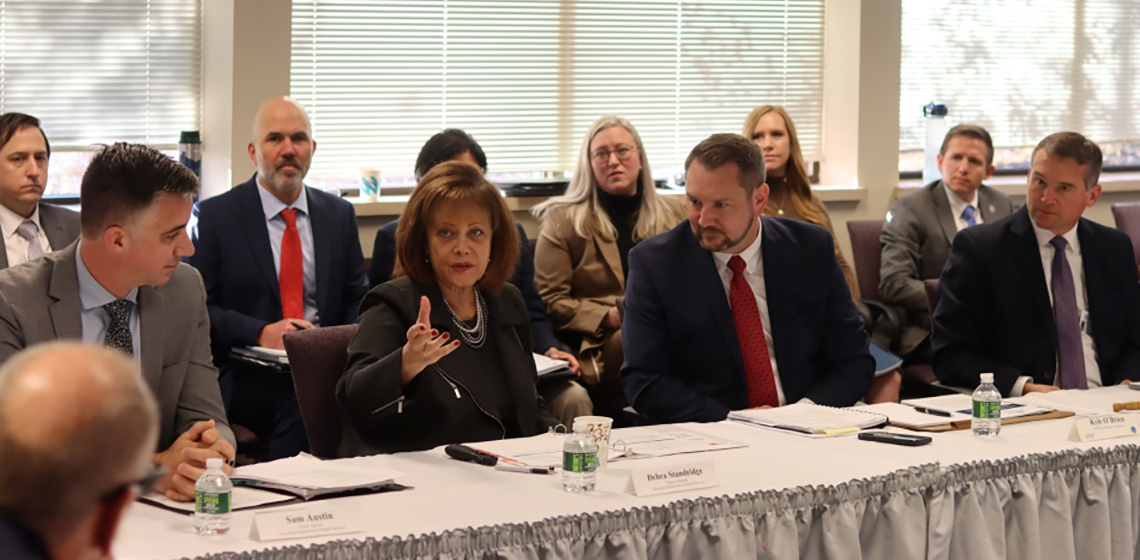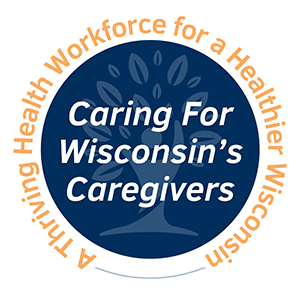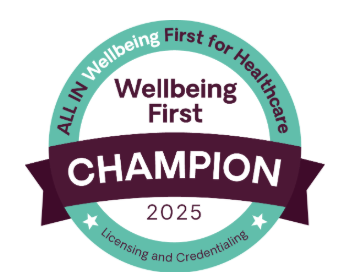Click here to view past issues
IN THIS ISSUE
- DHS Leaders Brief WHA Board on Rural Health Transformation Program Funding
- POLL: Two-Thirds of WI Voters More Likely to Support Candidates who Support Hospitals
- Wisconsin Hospitals, Health Systems Show Modest Signs of Financial Improvement in 2024
- National Shortage Designation Update Underway
- Registration Open for 2026 Physician Leadership Development Conference
- Last Chance to Register for Nov. 6 Hospital Board Education
EDUCATION EVENTS
Mar. 4, 2026
Spring 2026 Annual Survey TrainingMar. 5, 2026
Operational Vacancy: An Effective Tool for Workforce PlanningMar. 12, 2026
Spring 2026 Annual Survey TrainingClick here to view education event calendar
View more issues of The Valued Voice
Sign Up for WHA's Newsletter
DHS Leaders Brief WHA Board on Rural Health Transformation Program Funding
Application due to CMS Nov. 5; awards to be announced Dec. 31
Wisconsin Department of Health Services’ Deputy Secretary Deb Standridge and DHS Policy Director Sam Austin joined the WHA Board of Directors on Oct. 23 to provide insight into the state’s application for the Rural Health Transformation (RHT) Program funding opportunity.
 DHS Deputy Secretary Deb Standridge updates the WHA Board on Rural Health Transformation Program Funding.
DHS Deputy Secretary Deb Standridge updates the WHA Board on Rural Health Transformation Program Funding.
The RHT Program is a competitive five-year, $50 billion federal funding opportunity available to all 50 states to strengthen and support rural health care. DHS is responsible for preparing and submitting Wisconsin’s application to the Centers for Medicare and Medicaid Services (CMS) by the November 5 deadline.
In his introduction of Standridge during the most recent WHA Board of Directors meeting, WHA President and CEO Kyle O’Brien thanked the Deputy Secretary for the ongoing collaboration and the extensive time she and the DHS leadership team have spent working on priorities important to Wisconsin hospitals.
“You spent a lot of time with us,” said O’Brien. “The communication has been excellent. We have talked many times along with RWHC (Rural Wisconsin Health Cooperative). We want to thank you for that.”
Standridge acknowledged the close working relationship between DHS and WHA. “I can say in the past year how close we’ve worked together,” said Standridge. “To put the (state) budget together and work on what the hospitals need.”
WHA and RWHC have strongly and consistently advocated for and urged DHS to use RHT Program funds to provide direct payments to rural hospitals to stabilize their finances and address the specific care needs that exist in their respective communities, using a simple distribution model with minimal paperwork.
Standridge and Austin recognized the financial challenges rural hospitals face as mission-driven organizations that provide critical services to their communities even though reimbursement is often not sufficient. However, they said, CMS has been very clear in its RHT Program guidance and elsewhere that direct payments to hospitals and other providers need to be directly tied to innovations that can be sustained beyond the 5-year funding opportunity.
Standridge and Austin agreed with a point WHA and RWHC have made repeatedly that there is no “one-size-fits-all” solution to addressing the health care challenges facing rural Wisconsin. They said one of DHS’s goals it is considering for its RHT Program application is to provide flexible funding opportunities for rural hospitals and other providers to the extent allowed by CMS. This would include broad-based funding allocated to all rural hospitals and other providers to support technology investments as well as funding opportunities to support specific needs in areas such as workforce training, recruitment and retention; care coordination initiatives; and unmet patient care needs.
Standridge noted DHS received almost 200 responses to its Request for Information (RFI) soliciting ideas on what to prioritize in Wisconsin’s RHT Program application.
“We recognize the role hospitals play and how important hospitals are going to be as we put this jigsaw puzzle together,” said Standridge. “We really appreciate all the RFIs (suggestions) hospitals and health systems sent in and appreciate the ongoing conversations we have had with (WHA) and (RWHC).”
Standridge added that CMS has committed to issuing RHT Program award decisions to states by December 31.
WHA Staff Updates to the Board
In his President’s Report, O’Brien provided a year-to-date update on WHA’s annual goals, pointing out key areas of focus, including the formation of the Health Care Middleman Task Force and A.I. Policy Forum. O’Brien also updated the board on the status of a few strategic messaging campaigns currently in the field:
- More Than Health Care – Showcasing the many ways Wisconsin hospitals support their communities beyond patient care.
- State Budget Praise Campaign – Recognizing state lawmakers who supported the state budget which provided much-needed financial relief for hospitals.
- Stuck in the Middle – A campaign by the Healthy Wisconsin Alliance, a 501(c)(4) affiliated with WHA that highlights the tactics of large, corporate health insurers that add cost and complexity to the health care system.
 WHA Chief Quality Officer Nadine Allen shared insights on the Caring for Wisconsin’s Caregivers grant under AHW’s Landmark Initiative, highlighting efforts to strengthen health care worker wellbeing. She also presented national data from the Dr. Lorna Breen Heroes Foundation’s All In: Caring for Caregivers initiative, which tracks progress among state medical licensure boards in updating mental health-related questions on licensing applications.
WHA Chief Quality Officer Nadine Allen shared insights on the Caring for Wisconsin’s Caregivers grant under AHW’s Landmark Initiative, highlighting efforts to strengthen health care worker wellbeing. She also presented national data from the Dr. Lorna Breen Heroes Foundation’s All In: Caring for Caregivers initiative, which tracks progress among state medical licensure boards in updating mental health-related questions on licensing applications.
 As of Sept. 19, 60 state boards nationally have earned the WellBeing First Champions for Licensing badge, including the Wisconsin Medical Examining Board, the first in the state to receive this recognition. In addition, 37 care facilities across Wisconsin have already received the WellBeing First Champions for Credentialing badge, demonstrating their commitment to supporting clinician wellbeing.
As of Sept. 19, 60 state boards nationally have earned the WellBeing First Champions for Licensing badge, including the Wisconsin Medical Examining Board, the first in the state to receive this recognition. In addition, 37 care facilities across Wisconsin have already received the WellBeing First Champions for Credentialing badge, demonstrating their commitment to supporting clinician wellbeing.
In the months ahead, WHA members will have the opportunity to participate in leadership trainings and learning collaboratives focused on advancing workforce wellbeing. These offerings will support organizations in building internal capacity, establishing dedicated roles or teams to lead wellbeing strategies and integrating those priorities into day-to-day operations and improvement initiatives. An initiative kickoff webinar is planned for November to further engage stakeholders and build momentum across the state.
WHA Vice President of Federal Affairs and Advocacy Jon Hoelter provided a brief update on WHA’s advocacy efforts at the federal level, where he said there has been a significant amount of activity impacting hospitals despite Congress precipitating a federal government shutdown at the end of September. “The biggest problem in Washington right now isn’t one specific issue, it’s the sheer volume of issues that we are dealing with,” said Hoelter.
While the shutdown has prevented Medicare’s expanded coverage of telehealth services and halted federal Hospital at Home services and enhanced funding for Medicare Dependent and Low Volume Hospitals, there has also been flurry of activity from the Trump administration outside of Congress in just the last few months, including:
- A new 340B rebate pilot for the 10 Medicare-negotiated prescription drugs.
- A new outpatient rule with implications for site-neutral payments, 340B, price transparency and the inpatient only list.
- New proposed tariffs on medical supplies.
- A new $100,000 fee on H-1B visas that will impact the ability of hospitals to add new physicians to meet the growing demand for care.
In addition to its advocacy on these issues, Hoelter said WHA is also continuing to educate Wisconsin’s congressional delegation on the impact of the One Big Beautiful Bill Act, the expiration of the enhanced premium tax credit subsidies and ensuring Wisconsin’s Medicaid preprint is approved by CMS.
DHS Leaders Brief WHA Board on Rural Health Transformation Program Funding
Application due to CMS Nov. 5; awards to be announced Dec. 31
Wisconsin Department of Health Services’ Deputy Secretary Deb Standridge and DHS Policy Director Sam Austin joined the WHA Board of Directors on Oct. 23 to provide insight into the state’s application for the Rural Health Transformation (RHT) Program funding opportunity.
 DHS Deputy Secretary Deb Standridge updates the WHA Board on Rural Health Transformation Program Funding.
DHS Deputy Secretary Deb Standridge updates the WHA Board on Rural Health Transformation Program Funding.
The RHT Program is a competitive five-year, $50 billion federal funding opportunity available to all 50 states to strengthen and support rural health care. DHS is responsible for preparing and submitting Wisconsin’s application to the Centers for Medicare and Medicaid Services (CMS) by the November 5 deadline.
In his introduction of Standridge during the most recent WHA Board of Directors meeting, WHA President and CEO Kyle O’Brien thanked the Deputy Secretary for the ongoing collaboration and the extensive time she and the DHS leadership team have spent working on priorities important to Wisconsin hospitals.
“You spent a lot of time with us,” said O’Brien. “The communication has been excellent. We have talked many times along with RWHC (Rural Wisconsin Health Cooperative). We want to thank you for that.”
Standridge acknowledged the close working relationship between DHS and WHA. “I can say in the past year how close we’ve worked together,” said Standridge. “To put the (state) budget together and work on what the hospitals need.”
WHA and RWHC have strongly and consistently advocated for and urged DHS to use RHT Program funds to provide direct payments to rural hospitals to stabilize their finances and address the specific care needs that exist in their respective communities, using a simple distribution model with minimal paperwork.
Standridge and Austin recognized the financial challenges rural hospitals face as mission-driven organizations that provide critical services to their communities even though reimbursement is often not sufficient. However, they said, CMS has been very clear in its RHT Program guidance and elsewhere that direct payments to hospitals and other providers need to be directly tied to innovations that can be sustained beyond the 5-year funding opportunity.
Standridge and Austin agreed with a point WHA and RWHC have made repeatedly that there is no “one-size-fits-all” solution to addressing the health care challenges facing rural Wisconsin. They said one of DHS’s goals it is considering for its RHT Program application is to provide flexible funding opportunities for rural hospitals and other providers to the extent allowed by CMS. This would include broad-based funding allocated to all rural hospitals and other providers to support technology investments as well as funding opportunities to support specific needs in areas such as workforce training, recruitment and retention; care coordination initiatives; and unmet patient care needs.
Standridge noted DHS received almost 200 responses to its Request for Information (RFI) soliciting ideas on what to prioritize in Wisconsin’s RHT Program application.
“We recognize the role hospitals play and how important hospitals are going to be as we put this jigsaw puzzle together,” said Standridge. “We really appreciate all the RFIs (suggestions) hospitals and health systems sent in and appreciate the ongoing conversations we have had with (WHA) and (RWHC).”
Standridge added that CMS has committed to issuing RHT Program award decisions to states by December 31.
WHA Staff Updates to the Board
In his President’s Report, O’Brien provided a year-to-date update on WHA’s annual goals, pointing out key areas of focus, including the formation of the Health Care Middleman Task Force and A.I. Policy Forum. O’Brien also updated the board on the status of a few strategic messaging campaigns currently in the field:
- More Than Health Care – Showcasing the many ways Wisconsin hospitals support their communities beyond patient care.
- State Budget Praise Campaign – Recognizing state lawmakers who supported the state budget which provided much-needed financial relief for hospitals.
- Stuck in the Middle – A campaign by the Healthy Wisconsin Alliance, a 501(c)(4) affiliated with WHA that highlights the tactics of large, corporate health insurers that add cost and complexity to the health care system.
 WHA Chief Quality Officer Nadine Allen shared insights on the Caring for Wisconsin’s Caregivers grant under AHW’s Landmark Initiative, highlighting efforts to strengthen health care worker wellbeing. She also presented national data from the Dr. Lorna Breen Heroes Foundation’s All In: Caring for Caregivers initiative, which tracks progress among state medical licensure boards in updating mental health-related questions on licensing applications.
WHA Chief Quality Officer Nadine Allen shared insights on the Caring for Wisconsin’s Caregivers grant under AHW’s Landmark Initiative, highlighting efforts to strengthen health care worker wellbeing. She also presented national data from the Dr. Lorna Breen Heroes Foundation’s All In: Caring for Caregivers initiative, which tracks progress among state medical licensure boards in updating mental health-related questions on licensing applications.
 As of Sept. 19, 60 state boards nationally have earned the WellBeing First Champions for Licensing badge, including the Wisconsin Medical Examining Board, the first in the state to receive this recognition. In addition, 37 care facilities across Wisconsin have already received the WellBeing First Champions for Credentialing badge, demonstrating their commitment to supporting clinician wellbeing.
As of Sept. 19, 60 state boards nationally have earned the WellBeing First Champions for Licensing badge, including the Wisconsin Medical Examining Board, the first in the state to receive this recognition. In addition, 37 care facilities across Wisconsin have already received the WellBeing First Champions for Credentialing badge, demonstrating their commitment to supporting clinician wellbeing.
In the months ahead, WHA members will have the opportunity to participate in leadership trainings and learning collaboratives focused on advancing workforce wellbeing. These offerings will support organizations in building internal capacity, establishing dedicated roles or teams to lead wellbeing strategies and integrating those priorities into day-to-day operations and improvement initiatives. An initiative kickoff webinar is planned for November to further engage stakeholders and build momentum across the state.
WHA Vice President of Federal Affairs and Advocacy Jon Hoelter provided a brief update on WHA’s advocacy efforts at the federal level, where he said there has been a significant amount of activity impacting hospitals despite Congress precipitating a federal government shutdown at the end of September. “The biggest problem in Washington right now isn’t one specific issue, it’s the sheer volume of issues that we are dealing with,” said Hoelter.
While the shutdown has prevented Medicare’s expanded coverage of telehealth services and halted federal Hospital at Home services and enhanced funding for Medicare Dependent and Low Volume Hospitals, there has also been flurry of activity from the Trump administration outside of Congress in just the last few months, including:
- A new 340B rebate pilot for the 10 Medicare-negotiated prescription drugs.
- A new outpatient rule with implications for site-neutral payments, 340B, price transparency and the inpatient only list.
- New proposed tariffs on medical supplies.
- A new $100,000 fee on H-1B visas that will impact the ability of hospitals to add new physicians to meet the growing demand for care.
In addition to its advocacy on these issues, Hoelter said WHA is also continuing to educate Wisconsin’s congressional delegation on the impact of the One Big Beautiful Bill Act, the expiration of the enhanced premium tax credit subsidies and ensuring Wisconsin’s Medicaid preprint is approved by CMS.
IN THIS ISSUE
- DHS Leaders Brief WHA Board on Rural Health Transformation Program Funding
- POLL: Two-Thirds of WI Voters More Likely to Support Candidates who Support Hospitals
- Wisconsin Hospitals, Health Systems Show Modest Signs of Financial Improvement in 2024
- National Shortage Designation Update Underway
- Registration Open for 2026 Physician Leadership Development Conference
- Last Chance to Register for Nov. 6 Hospital Board Education

